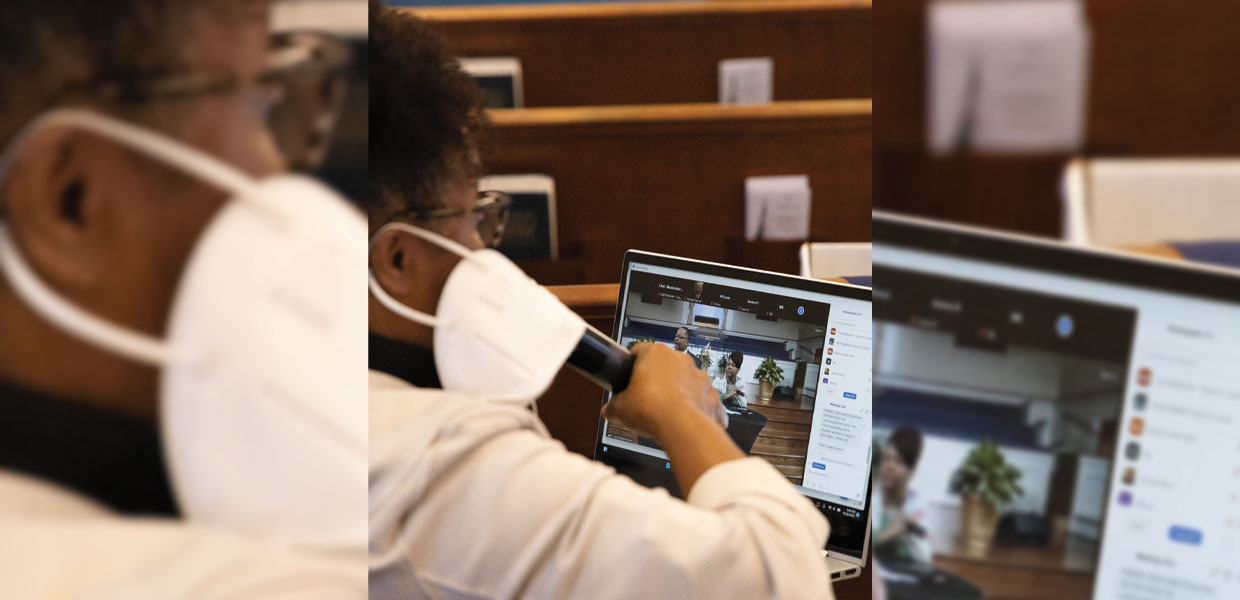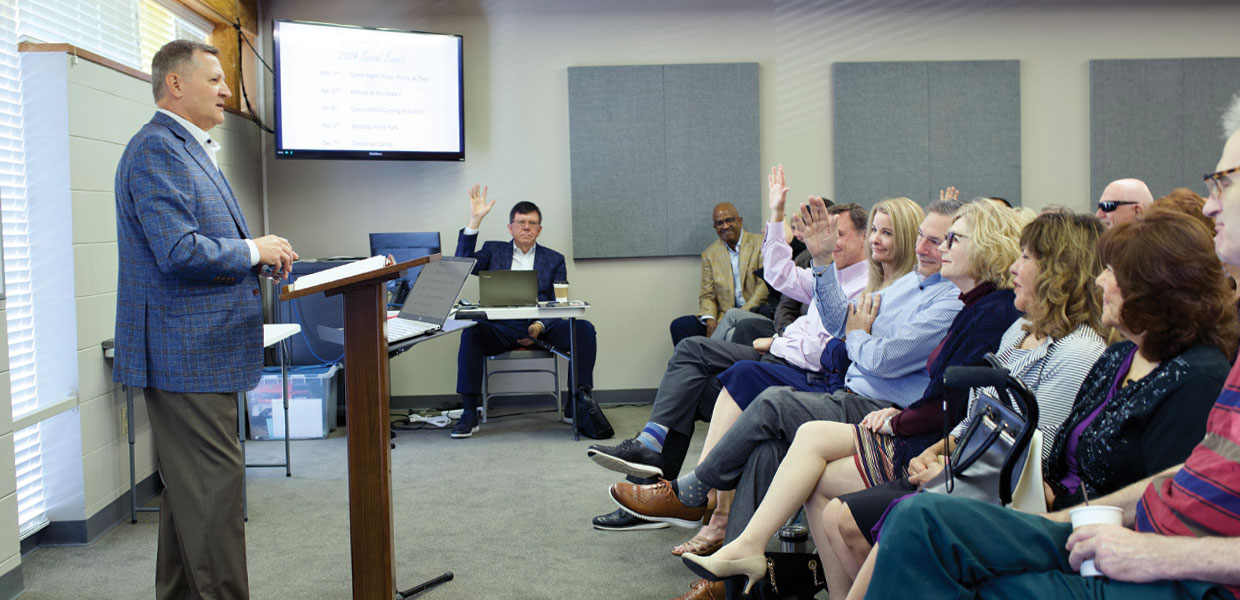




When James White wrote the first Sabbath School lesson in 1852, the concept was not new. Sunday School, with the original intent to provide education to illiterate children who worked Monday-Saturday, began almost 100 years earlier, according to Christianity Today. However, as the Adventist Church was in its forming stages, the first Sabbath School lessons placed an emphasis on the need for personal Bible study.
Today, Sabbath School still holds significant importance, serving as a platform for education, spiritual growth, and community bonding.
Bible Study and Knowledge
Leading up to Sabbath, members worldwide study their weekly Sabbath School lesson in preparation for Sabbath discussions. Terri Taylor, Sabbath School general superintendent for Berean Church in Atlanta, Georgia, emphasized the essential link between Bible study and Sabbath School.
“If I had to sum up Sabbath School, it’s Bible study,” said Taylor.
According to Darryl Howard, M.Div., South Atlantic Sabbath School ministries director, Sabbath School serves as a foundational element in the Church.
“Sabbath School is a very important part [of the Church] because it links the Church together in study,” emphasized Howard.
Echoing this sentiment, Sabbath School coach Curtis Hall highlights its role in fostering a stronger church community through personal Bible study and discussions.
“I believe Sabbath School is an opportunity because Sabbath School done right is our chance to investigate the Bible, to understand its principles, and to have discussions about how it’s applicable in our lives,” said Hall.
Both Howard and Hall assert that Sabbath School is equally as important as the divine church service.
Interaction and Relationships
One of the primary differences between Sabbath School and divine church service is the interactive element of Sabbath School. Whereas the church service is often enjoyed from an observer viewpoint, Sabbath School allows active participation.
Hall believes there are three “I’s” in Sabbath School: information, inspiration, and interaction. Without interaction, Hall says Sabbath School can become boring.
“You must have interaction today if you want to grow Sabbath School,” said Hall. “…Interaction is vital.”
This interaction is not only confined to discussing the Sabbath School lesson, but also includes personal matters. Howard suggests that Sabbath School, in addition to Bible study, is also about building relationships and a stronger church bond.
“Sabbath School is the one framework and one time element on a weekly basis that members can interact and find out how one another’s doing,” explained Howard.
For Esther Green, M.Div, it was this combination of interaction and relationships through Sabbath School that kept her in the Church.
Upon moving to Atlanta in 2004, she attended a church where Hall led a Sabbath School class. Engaging discussions and Hall’s insightful questions captivated Green, contrasting sharply with her struggle to stay awake during the divine service. Week after week Green experienced the same cycle, enjoying Sabbath School and then falling asleep during the church service. She was frustrated and resolved to stop going to church altogether, planning to listen to sermons on CDs. However, Green felt a calling to continue attending Sabbath School. Over time, she found a church she resonated with, eventually becoming a Sabbath School teacher herself.
However, challenges arose when Green started seminary at Andrews University. Viewing Sabbath School as an extension of her academic workload, she gradually attended less frequently. The onset of the pandemic in 2020 further disrupted in-person church gatherings, prompting Green to reconnect with Hall. She asked him to do something for all the people who still longed for Sabbath School. In response, Hall initiated “Hit the Mark” Sabbath School, an online Sabbath School class with panelists.
About three months into “Hit the Mark,” Hall asked Green to participate as a panelist. She agreed and has often appeared as a panelist since.
“I credit Sabbath School for rescuing me,” said Green. “Hall rescued me by asking me to participate.”
Today, Green has her own training program for Sabbath School teachers, hoping more teachers can do what Hall did in her life: interact and engage with Sabbath School participants.
Training
Sabbath School training plays a crucial role in equipping individuals with the necessary skills to effectively lead Sabbath School. Unfortunately, many individuals lack formal training in this area, often leading to missed opportunities for enriching Sabbath School experiences.
Howard said training Sabbath School leaders is critical because it helps them become facilitators, which fosters more interaction.
“A facilitator allows the class to grow and to express themselves. And so, we’re trying to get churches to shift from the teacher mode to the facilitator mode,” said Howard.
The South Atlantic Conference offers training for Sabbath School superintendents and teachers by going into an area and inviting 15-20 churches to attend a Sabbath afternoon resource and strategies session.
The Gulf States Conference also sees the importance of Sabbath School training and annually holds a training in February. These meetings help adult Sabbath School teachers, superintendents, and personal ministries leaders create more immersive and mind-stimulating environments.
“Sabbath School is a most important ministry as we have the vital task of teaching individuals how to study the Bible,” said Martin Fancher, Gulf States Conference executive secretary.
Challenges
Despite the personal testimonies and acknowledged importance of individual study and connection, many Sabbath School leaders have observed an underappreciation of Sabbath School on all Church levels, from members to Church leaders.
“Sabbath School is not valued as it should be in our Church,” said Hall.
These observations are reinforced by statistics within the Southern Union. Recent data suggests an overall decline in Sabbath School, according to David Long, Southern Union Sabbath School director.
Innovation
To address Sabbath School’s challenges, churches are implementing innovative strategies. Howard and Taylor advocate for renaming Sabbath School classes as a tactic to boost attendance. For instance, the Berean Church rebranded a class to attract a broader audience, especially those unfamiliar with Sabbath School.
“We decided on [renaming the class] “Atlanta Berean Good News Bible Study” … because we’d like to emphasize Bible study,” said Taylor.
Since the pandemic, many churches have added online Sabbath School classes. Long said that while physical attendance is down, online Sabbath School attendance has greatly impacted some churches.
“Some of the Sabbath Schools I have talked to doubled, and some have even tripled in attendance because of their online presence,” said Long.
Some churches have seen a need for Sabbath School classes which provide an alternative study approach to the Adult Sabbath School lesson offered by the Church. About a decade ago, the “Grace and Truth” class was initiated by Terry Shaw, AdventHealth president/CEO; Loran Hauck, a member of the Leadership Institute team at AdventHealth; and Ted Hamilton, former chief mission integration officer at AdventHealth.
This Sabbath School class follows a book-by-book study method, with open discussion encouraged. Their studies focus on knowing God, lifting up Jesus Christ, and practicing love guided by the Holy Spirit.
“We also poll the class from time to time on what they would like to study; what do they have questions on; how to best use the time together to learn, grow, and expand our understanding of the Scripture,” said Hamilton.
This approach to Sabbath School consistently draws 50-70 attendees each week since its inception. The group has fostered a sense of community not only through Bible study and discussion, but by meeting outside of Sabbath morning class time. The group gathers socially, either rotating through one another’s homes or meeting elsewhere in small groups. At least once a year, the whole class will choose one Sabbath to worship and study together outside at the park.
Outreach
Over the years, some classes have funded or participated in mission projects and outreach initiatives. Riverside Chapel, in Nashville, Tennessee, stands out for its involvement in these endeavors.
According to Cynthia Macon-Bates, M.Div., grow and discipleship ministry director, each class supports a specific mission project, providing financial aid for both local and global projects.
“Some [of the funds go to people] who may need their utilities paid or their rent paid or help with a Christian education, tuition assistance, those types of things,” said Macon-Bates.
Additionally, the various classes are involved in hands-on ministry. The church has a food pantry at which different Sabbath Schools volunteer, including children. The classes have also assisted with flood victims, drug addicts, and the homeless, among other ministries.
The Sabbath School classes are active in the planning and executing of these projects, often forming committees as needed. The church’s homeless ministry, which started from a Sabbath School class, has evolved into its own non-profit organization.
“Sabbath School community involvement is the absolute best way of building relationships that I have ever experienced,” stated Macon-Bates.
Macon-Bates, however, suggested the people impacted most by the outreach programs are those helping run them.
“It will grow the individuals who are reaching out more than it will the people who need to be ministered to,” said
Macon-Bates.
Sabbath School, regardless of its innovative or traditional approach, continues to be a cornerstone of the Seventh-day Adventist Church by providing vital spaces for relationship building and spiritual growth.



Comments are closed.